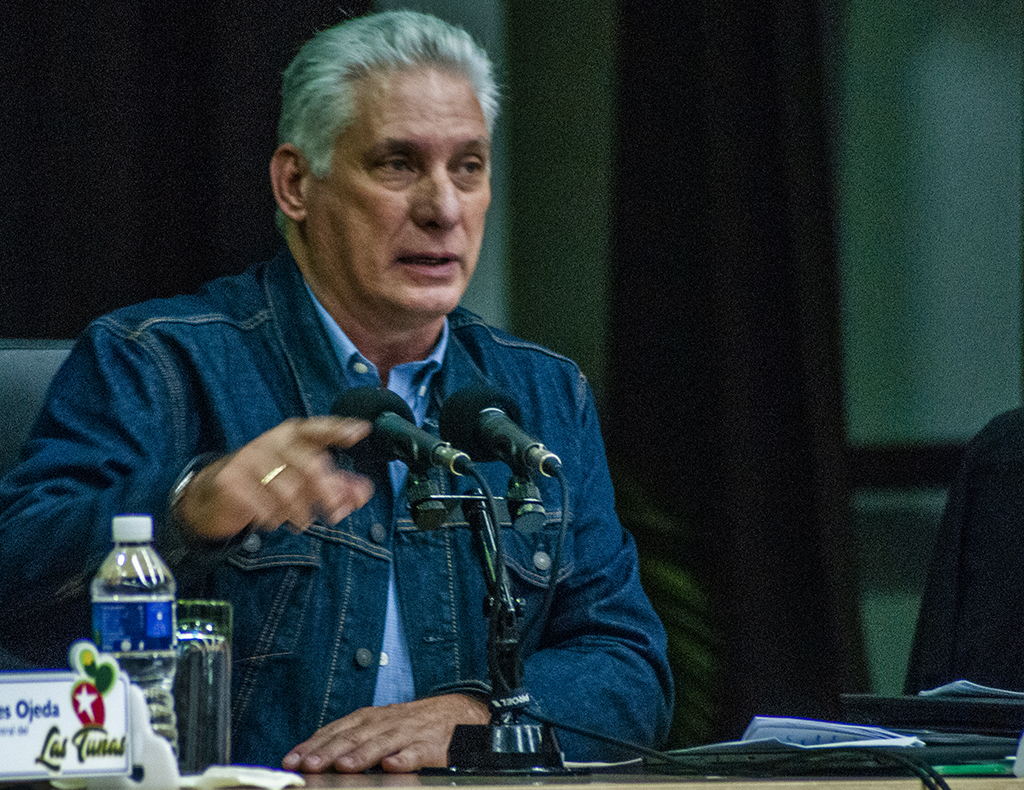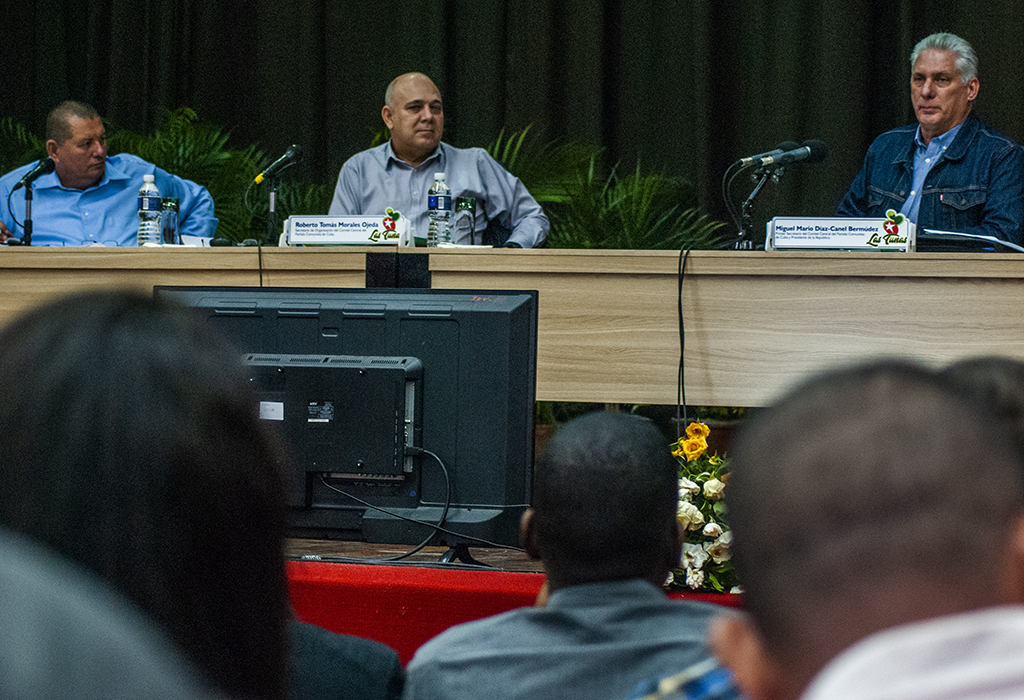
We are here not to hear reports but concrete actions, that was the challenge with which he opened the meeting of the first secretary of the Central Committee of the Party and president of the Republic Miguel Díaz-Canel Bermúdez together with other key representatives of the national executive power, with political and government leaders, of the mass organizations; as well as with managers, producers, entrepreneurs of this province of eastern Cuba.
Las Tunas, Cuba.- Díaz-Canel did not evade reality when he pointed out that "we know that the food problem has not been solved here, that we have delays in the harvest, that there are quality problems in some services, for example, such as health; in other words, the problems have not been solved". This was the fourteenth contact held by the country's top leadership in each of the Cuban provinces, inspired by similar exchanges presided over at the time by the Historical Leader of the Revolution, Fidel Castro, and Army General Raúl Castro in the early 1990s when the country's situation was proportionally more difficult than it is now.
At the opening, Roberto Morales Ojeda, Secretary of Organization of the Central Committee, insisted that the purpose is to move from the diagnosis of the problems to the proposal of concrete solutions that will re-launch the country towards the necessary prosperity of Cuban socialism. Taking part in the meeting was also a member of the Political Bureau and Prime Minister of the Republic, Manuel Marrero Cruz, as well as Manuel René Pérez Gallego, member of the Central Committee and first secretary of the Party in the province, and Jaime Ernesto Chiang Vega, the provincial governor.
On the occasion of this meeting, Las Tunas presented its integral strategy for the coming year, which includes, among other aspirations, the productive transformation and the international insertion of its economy, betting on its endogenous resources. The purpose, however, will not be easy, as shown by the data made public at the forum.
The Balcony of the Cuban East begins 2023 with a high budget deficit, a third of its state-owned enterprises in losses, more than 49 thousand hectares of its arable land unexploited, and persistent inflation encouraged by a negative trade balance and a depressed supply of products or services.
In the face of this, the Land of Vicente Garcia intends to strengthen and dynamize its gears of food production, expanding the delivery of land in usufruct. He trusts in the forecasts of productive growth in almost all areas of agriculture, livestock, and heavy and light industries. He also does not rule out new steps in the construction of houses and the improvement of the existing ones, with emphasis on those that still have dirt floors. Not to mention the long-delayed solution for those who lost their homes completely due to extreme meteorological events. Other improvements to its telecommunications infrastructure, public transportation, necrological services, general education, and medical care are also on the agenda.

IF THEY CAN DO IT, WHY CAN'T OTHERS?
After listening to the testimonies of the directors of the Grain and Integral Agropecuaria companies, who presented their respective ways of overcoming the daily pitfalls and getting ahead; as well as the comments of Arturo Proenza García, president of the Guabineyón 4 basic cooperative sugarcane production unit, and of peasant Luis Manuel Sánchez, whose yields in their agricultural crop areas far exceed those of their counterparts, Miguel Díaz-Canel affirmed: "We have a strategy and a group of entities that have shown that during this complex situation, things can be done and progress can be made. But they are still exceptions. What do we need? All this needs to be multiplied, all this needs to become the rule."
Also motivated by the presentations made by the heads of the Stainless Steel Company (Acinox) and the University of Las Tunas, the Cuban president emphasized "we have already been changing the concepts. The country, he said, cannot work from the top down to the locality; it has to work from the locality, solving the problems of the locality, of the municipality. Each one taking advantage of its potentialities, its culture, its elements of identity, and its endogenous forces", he assured.
"The good experiences, he said, must be multiplied at the local level. But for that, we need managers: people who have the capacity, the sensitivity, and know how to pull all the strings needed to manage a process or a project on a local scale; who have to know how to seek financing, how to convene, how to train the human potential; how to work with all the actors that can be integrated."
"That, he concluded, takes science, education, and training. We have a willing University that has that incorporated knowledge, already developed; and, in addition, that has municipal university centers. If we harmonize all that, this meeting will have worked and in a short time, there will be changes, and this will be a better year. However, it also helps us to consolidate a group of ideas to project ourselves in the near present and the future. This is precisely the movement that we want to create with this type of meeting that we are holding."
For his part, the prime minister made it clear to the audience, composed entirely of government and political decision-makers from all over the province, that making this a different year cannot be a slogan: "It is a commitment to the people to achieve it, doing things differently, taking advantage of the available resources, joining forces, listening to the young and to those who have more experience."
Marrero Cruz added that the goals set are primarily the responsibility of the government here. For this reason, he said, it must improve its functioning at all levels, implement the new structures agreed upon, and overcome without massive layoffs the imbalance in favor of the budgeted sector and not the productive sector, which is the labor force with permanent employment in this territory. "It is necessary to organize and prepare better. Reviewing, for example, the meetings, their relevance, and their quality so that they are a moment of decision making", he said. This involves, he pointed out, rethinking the current scheme of government visits so that they become the way to bring the ministries closer to the municipalities. "The application of science and innovation is urgent," he said.
He also pointed to the need to strengthen the link between state and non-state enterprises, stimulating domestic production over imports. He also pointed out that it is necessary to renew local development strategies, bringing them closer to the needs of each region.
"The criterion for evaluating what we do must be the satisfaction of the needs of the people, their opinions; therefore, similar contacts must be maintained in each work group", Roberto Morales Ojeda also stated, emphasizing that "what we discuss here must be submitted to the people's control."





